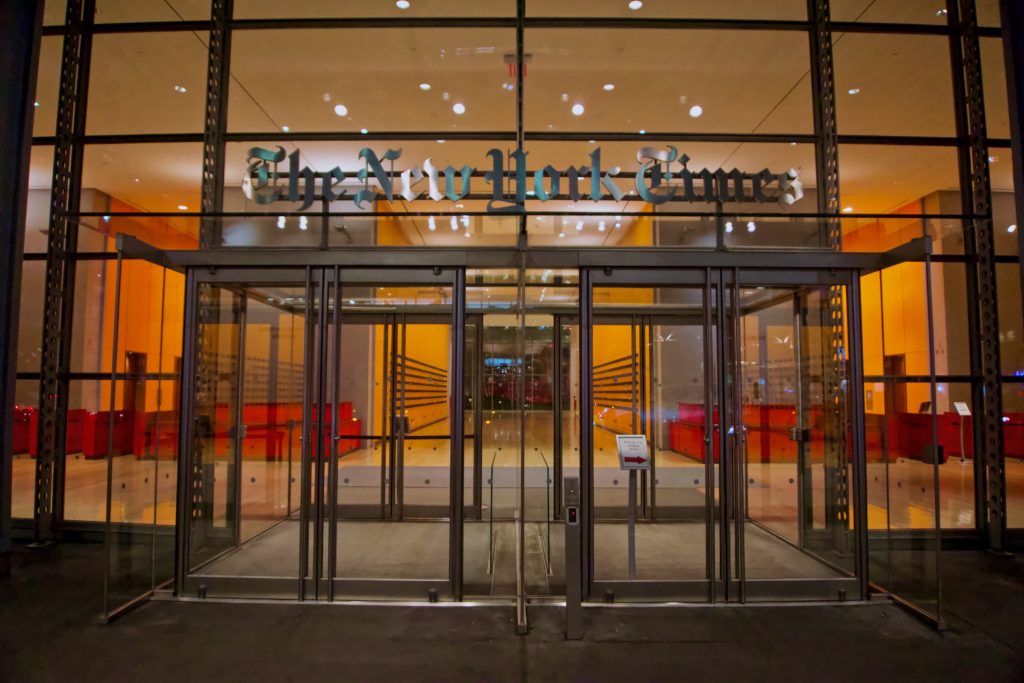The Peninsula
Will Seoul Become Asia’s Media Hub?
Published September 16, 2020
Category: South Korea

By James Constant
In July, the New York Times announced that it would move its Hong Kong-based digital news operation to Seoul over the course of the next year in response to the Chinese territory’s powerful new national security law, which went into effect in June. Already, press freedom in Hong Kong has come under attack. Jimmy Lai, the publisher of pro-democracy newspaper Apple Daily, was arrested under the law on August 10, and Hong Kong work visas for foreign journalists are now reportedly being vetted by a new national security unit.
The Times’ move to Seoul can be explained both by the worsening environment for journalism in Hong Kong and the generally poor state of press freedom in Asia. The paper mentioned that Bangkok, Singapore and Tokyo were also considered, and cited South Korea’s “friendliness to foreign business, independent press, and its central role in several major Asian news stories” as factors weighing in Seoul’s favor. South Korea is currently ranked 42nd out of 180 countries on Reporters Without Borders’ World Press Index, the highest in Asia, with only Taiwan approaching Korea’s ranking. Singapore, which has been floated as a potential landing spot for international financial firms based in Hong Kong, has an atrocious record on press freedom, and the city-state’s Media Development Authority has broad censorship powers. Taiwan’s geopolitical situation precludes effective China coverage. Tokyo is even farther from Southeast Asian news stories than Seoul, and Japan has seen a backslide in press freedom since the Specially Designated Secrets act went into effect in 2013.
Considering the current situation, the New York Times is not alone – the Wall Street Journal and Washington Post are also considering moving staff from Hong Kong. Should they do so, Seoul is an attractive option – if only because other options in Asia are so limited.
It wasn’t long ago that South Korea was mired in its own dark days of media repression, which extended to foreign correspondents. Steven Butler, who worked for the Financial Times and Christian Science Monitor in Seoul during the mid-1980s, recalled that the South Korean government “wanted foreign correspondents, but didn’t want them to write things they didn’t like. During the Chun Doo-hwan administration, they would invite you out to lunch, then pull out an article you wrote.” John Burton, who worked for the Financial Times in Seoul in the 1990s, after Korea’s democratization, wrote a story about a corruption scandal surrounding the son of then-President Kim Young-sam. He said his editors received a request from the government that Burton leave the country.
Reporters for international news organizations have had a much easier time in more recent years. The most notable example of overreach by the current Moon Jae-in administration against foreign media was its racially-tinged singling out of a Korean Bloomberg reporter and describing his article as “borderline traitorous” for likening Moon to a North Korean spokesman. After facing heavy criticism from reporters’ organizations, the Blue House quickly walked back its statement.
While conditions have certainly improved over time, one of the most worrying elements of South Korea’s current press freedom situation is the potential for a regression in the future. Moon’s predecessor, now-imprisoned former President Park Geun-hye, presided over a cultural blacklist, and South Korea’s World Press Index ranking reached an all-time low of 70 in 2016, Park’s last year in office.
In separate reports on press and political freedom in South Korea published during the Park administration, the United Nations Human Rights Commission, Reporters Without Borders, and Freedom House, an American watchdog group, all cited criminal defamation laws and the National Security Act as key tools of repression. These laws remain unchanged today.
Revealing facts can still be punished by up two years in prison under the current defamation law. The National Security Act, introduced in 1948, provides stern penalties for vaguely-defined acts that may benefit North Korea, and was used in 2012 to imprison a photographer for satirically retweeting messages from a North Korean Twitter account. Human Rights Watch has repeatedly called for the National Security Act to be repealed. As long as these laws remain on the books, reporters in South Korea must be wary of running afoul of them, with the inevitable result being self-censorship.
These concerns may seem minor compared to the new atmosphere of hostility to the press descending over Hong Kong. But Seoul currently has an opportunity to position itself as the new capital for international media in Asia, which could confer the same kind of cosmopolitan image to the city that Hong Kong currently enjoys.
In August, the Seoul city government set up the Seoul International Financial Office in Yeouido, which offers a variety of benefits for international financial firms looking to relocate to the city. South Korea has presented no similar plan for relocating media companies, but addressing problems in the legal code would be a good first step.
Revisions to South Korea’s National Security Act and draconian defamation laws could make the country Asia’s undisputed leader in press freedom, considering the miserable state of much of the region. South Korean politicians have long demonstrated their interested in bolstering the capital region’s prestige as a global city through major infrastructure projects like the Songdo International Business District and Incheon International Airport. By rethinking their approach to focus on revising the law to promote free expression, South Korea would be well-positioned to turn Hong Kong’s potential loss of prestigious international media companies into Seoul’s gain.
James Constant is an MA candidate in East Asian Studies at Leiden University. The views expressed here are the author’s alone.
Picture from the flickr account of Andreas Komodromos.
